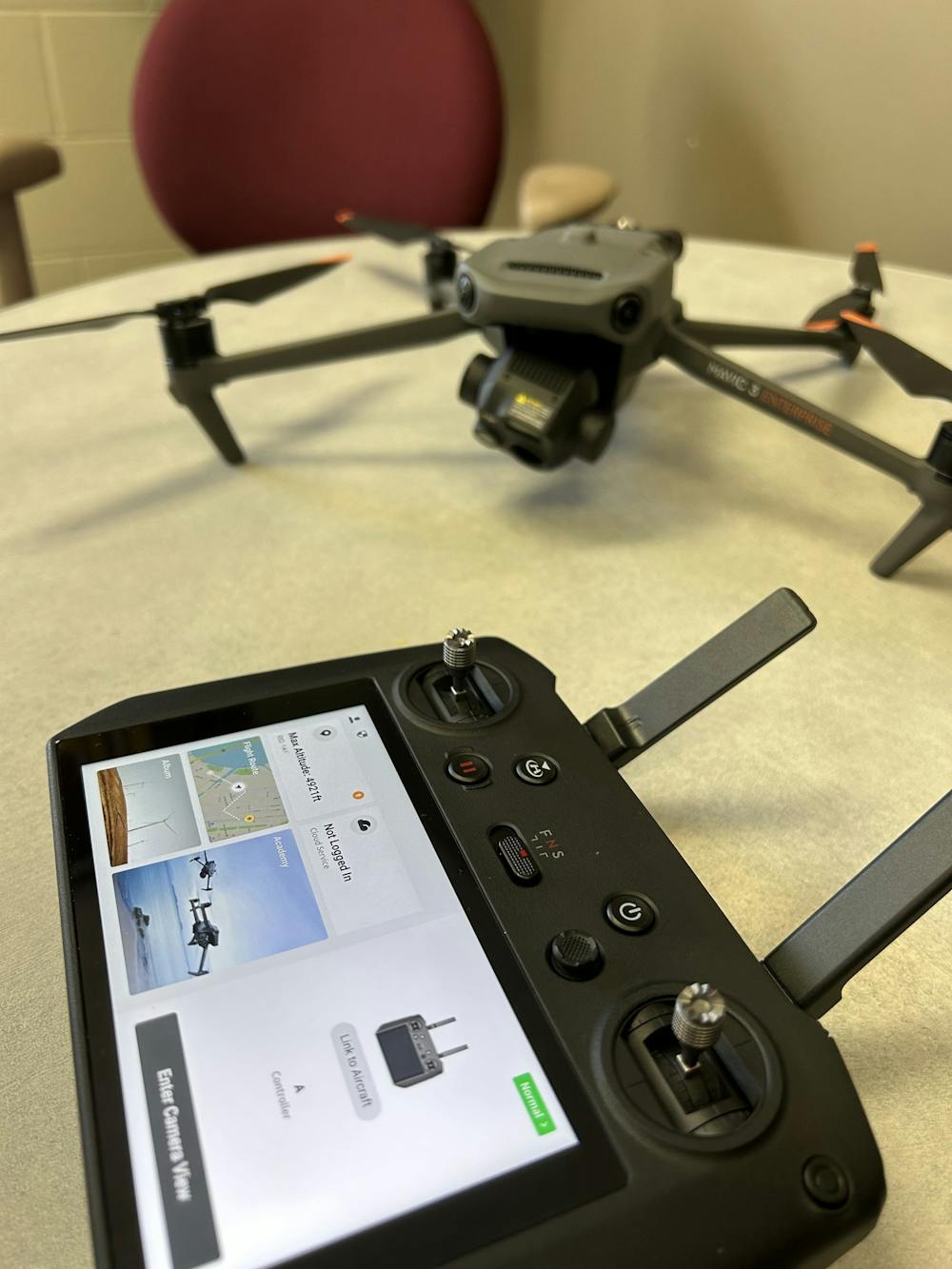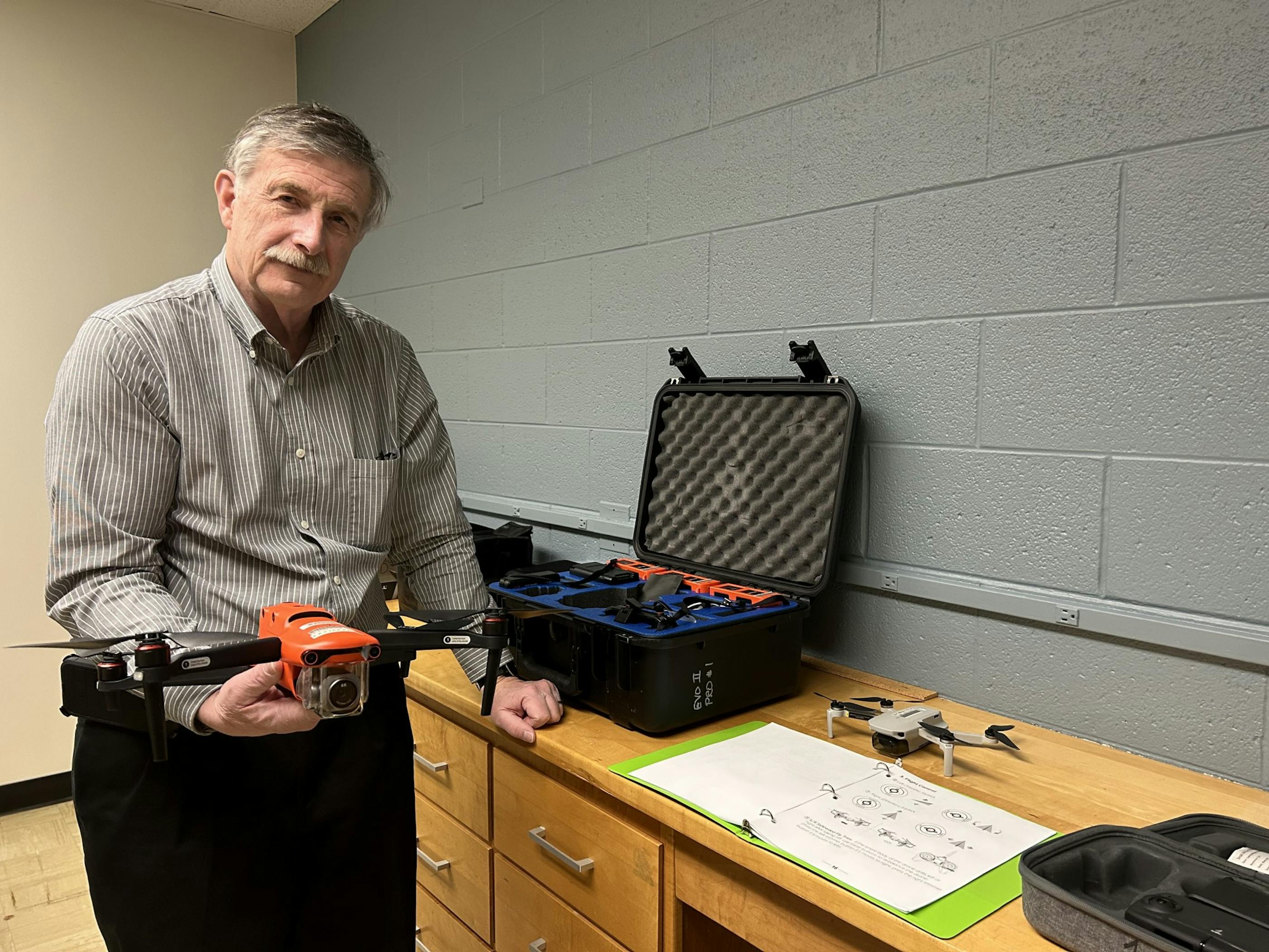Sky is not the limit: drones soar in CMU curriculum and support

The drone that CMUPD uses placed on the Lieutenant Michael Sienkiewicz desk for a picture on the campus of Central Michigan Univeristy, April 7, 2023.
As new technologies fill the marketplace, Central Michigan University students have opportunities to learn and get hands-on experience in drone operations.
CMU now offers a Drone Certificate degree and drone courses through the multidisciplinary Drone Lab.
The Lab also partnered with the CMU Police Department to train CMUPD officers how to use drones.
What is the CMU Drone Lab?
The CMU Drone Lab in the department of the Broadcast and Cinematic Arts is a home to more than 30 different drones ready for the students’ usage. It offers courses in drone regulations and operations, as well as a drone certificate.
According to Kevin Campbell, a faculty member in the School of Broadcast and Cinematic Arts, the drone lab started in August 2022. However, the drones were acquired prior to 2019 through the Provost and President’s grant.
The drone certificate is a nine credit hour certificate that offers knowledge in the drones’ operations, Campbell said.

Kevin Campbell, a faculty member in the School of Broadcast and Cinematic Arts, holds a drone in the CMU Drone Lab on the campus of Central Michigan Univeristy, April 10.
The CMU Testing Center also hosts a Federal Aviation Administration (FAA) drone exam that students can take after completing their courses to get their pilot’s certificate.
The Drone Lab has worked with different departments connected to studies in geography, art and parks and recreation, providing students with access to drones, Campbell said.
“Drones are used in forecasting and weather study,” Campbell said. “They’re used in geographic mapping … then there’s a media perspective. … We have a whole lot of things that we can think can be done with drones, and the list keeps growing.”
Benjamin Heumann, a faculty member in Geography and Environmental Studies, said in his geography capstone class this year, a student who had taken the Drone Lab courses, used drones for their project. With its help, they built a map for a 250-acre wood area.
“They’re using drones to kind of get that bird’s eye view to get a better sense of landscape in place,” Heumann said. “(They are) using GPS technology to collect data in the field and drones, because in industries that our students end up working in it’s the combination of those things. … An engineer draws something, but then the crew oftentimes will use drones to then map how a project is processing through time.”
The CMU Drone Lab also partnered with the CMUPD, Campbell said.
CMUPD and the Drone Lab partnership
Campbell said the campus police department reached out, looking to use drones in search and rescue as well as for monitoring big activities on campus, such as football games.
He taught the police officers a drone training in October 2022. It took around a week.
Michael Sienkiewicz, a CMUPD lieutenant, said 11 out of 23 police officers took the training. Three of them have already passed the FAA exam, and others are going to take it soon, he said.
“Our goal is to make it really accessible to our officers,” Sienkiewicz said. “We see it as another tool. … It’s nice to have it when you need it.”
During the training, officers did a lot of studying “outside of the class” Sienkiewicz said. Police officers for their practice monitored a CMU football game.
“It’s been a good partnership,” Sienkiewicz said. “It’s a neat new program that we were able to do at very minimal cost to university, so we’re excited to see what it does in the future.”
Sienkiewicz said around the end of March 2023, an elderly person in their 90s went missing in Shepherd. CMUPD headed out there to support the search with drone technology. The person was found safe.
“Drones are becoming more common and accessible for police departments to have and … to help keep our community safe,” Sienkiewicz said.
Challenges and the future of drones
Even though the drones are a more accessible and effective alternative, they still have their own challenges.
For example, flights often depend on the weather conditions Campbell said.
“Drones, just like airplanes, can ice up,” Campbell said. “Rain is not so good for drones, high winds are not so good for drones. … They fly fine in the wintertime … (and) summertime -- you’re not bound by specific seasons -- but you have to just pay attention to your weather conditions.”
Battery life is another challenge drone pilots might face. Campbell said batteries usually last for from 20 to 40 minutes, depending on the battery type.
Heumann said that in future we might see a new generation of batteries for drones that would last longer.
Nevertheless, the drone industry will only continue to grow, Campbell said.
“Every day I hear about something new (connected to drones),” Campbell said. “Because it gives you a different view, you can collect data and information from positions that you couldn’t otherwise.”
And Heumann expects to see more and more students in their studies and careers applying drones for different reasons.
“I really hope that students see the opportunities there and take advantage of them,” he said. “I think that there’s really an opportunity there to create a community, particularly with students of learning together in a passionate group who are excited about this technology.”
To learn more about the CMU Drone Lab and the Drone Certificate, visit the CMU’s website.






